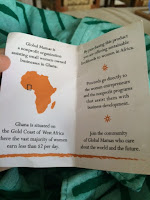We arrived in Addis Ababa around 9pm on Saturday night. By the time we got through paying for our visa and the Disney World-esque queue at Immigration, we finally arrived at our hotel around 11pm. We had a quick bite and went to bed. First impressions of Ethiopia: it rains a lot, the air is incredibly clean and Addis is quite high in elevation (2400 meters... that's higher than Denver).
A few weeks ago, we signed up for a food and market tour with a company called "Addis Eats". We met the tour guide at a coffee shop called Oh Canada at 11am. It was incredibly Canadian. Maple leafs all over the place with a massive Ottawa Senators flag hanging proudly from the ceiling. Who would've thunk? We met Genet, our tour guide, and another woman named Els (from the Netherlands who had been living in Nairobi for the last 6 years) who was also coming on the tour.
Off we went to the Shola market (which is quite a bit smaller and less overwhelming than it's 'Mercado' counterpart). We saw raw coffee beans, fruits and vegetables, live chickens, fabrics, etc. Unfortunately, many shops were closed since it was Sunday. We learned a lot about the culture of Ethiopia just in that half hour as Genet explained the gender roles and how only men are allowed to kill the chickens. So, if a woman is unmaried or has no man at her home, she has one of the men at the market kill it for her. After our quick muddy walk through the market, we moved on to the good part... The food.
We went to a bunch of places, all of which would not have been found by a tourist. The first place we had injera, which is a spongey pancake like thing the size of a large pizza. It's surprisingly light in texture due to the grain, teff, which they use to make it. One side is smooth but the other side has nooks and crannies like an English muffin. You then put different stew-like things on it, one made of lentil, one of chickpea, another slightly more spicy with chili but all of it vegetarian. The method is to use only your right hand (left is used for wiping in the bathroom so it is not to be used while eating), rip a piece of the injera, lay flat on top of some sauce, and then pinch to allow the pockets to absorb the stew. Last challenge is trying to get it all in your mouth without touching your lips. We had never had this traditional Ethiopian dish before, but both agreed it was our favorite of the day.

Next stop was a beef place that was packed with people. Genet ordered a very small portion of raw beef for us to try as it is very common. Dan and I had one or two pieces but decided it wasn't for us. We then got a large platter of cooked beef with injera and some chili sauce/spices. That was much more up our alley.
After beef, we went to a seafood place and had fried tilapia. It was cooked really well and seasoned with just lime juice. Next was a coffee shop where the coffee ceremony was performed. The entire ceremony takes about 2 hours from start to finish as all Ethiopians roast their own beans at home. As that takes quite a bit of time, we skipped to the boiling of the already roasted and ground beans. The coffee was strong but very good. Once served, we each got a sprig of sweet basil which we were told to stir our coffee with to lessen the bitterness.
Last but not least we went to a juice bar. We had a juice prepared with mango, pineapple, avocado and papaya. No ice, just pure flesh of fruit puréed in a blender. It was about $2 per glass and Dan and I promptly made jokes about the hipsters in San Francisco who would be charging 7x as much and claiming it was for the ambiance.
After all that, we said our goodbyes and Genet gave us the takeaway bag we purchased when we originally registered. We got three different bags of whole bean Ethiopian coffee and a souvenir coffee pot, which we were told not to actually boil coffee in haha.
While our time in Ethiopia was short, we learned quite a bit about the culture and were very glad we stopped there. Dan made an excellent point that he would have lumped Ethiopia in with Kenya, Tanzania as another East African countries. It's clear the sense of pride that Ethiopians have for their culture, and their food. Thankfully, they are more than willing to share that love with foreigners like us.
































